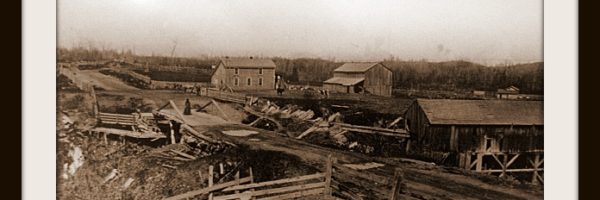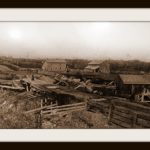
History of Harlow Farms
Overview
From the days when early Ojibway families roamed and hunted these upland forests to the first homesteaders who arrived in the early 1850’s, this beautiful area overlooking Lake Superior has attracted families to settle and live.
The Harlows are one of the founding families of the city of Marquette, having moved from Worcester,Massachusetts in 1849. When Amos Harlo (1815-1890) arrived ahead of the rest of the family, he was the guest of Chief Kawbawgam at his home at the mouth of theCarpRiver. Amos’s wife, Olive, their three year old daughter, Ellen, and Olive’s Mother, Martha Bacon, aged 47, arrived soon after Amos by ship.
The family first stayed in a rough log hut near the lakeshore in what would becomeMarquette. They soon bought acreage including a waterfall on Whetstone Creek (now under US 41). The land was purchased in Martha’s name from Frank Benson with money from the sale of land to the Plank Road Co. for the right of way. Martha called the property “Eureka”. This is the land where Harlow Farms sits now.
Amos Harlow built a sawmill and a small house here at Harlow Farms, beginning with lumber hauled by mules from a mill on the Carp River. It was a single-board house with two stories. There was one room below for cooking and eating, and one above for sleeping. Amos, Olive, and Ellen moved in during the fall and lived together in this house, also boarding men who were employed in building the mill and prospecting for iron ore. The family raised produce on the farm to feed themselves and their boarders, both at the mill and at their boarding house in town. They sold produce to the many men that worked at the mines to the west.
Mother Martha Bacon moved out to the farm when the rest of the family moved to town to live in a new home that had been constructed for them on Fourth Street, which still stands today. Martha Bacon lived at the working farm for seventeen years. She moved into town in 1874 and died the very next day.
The farm was worked until the late 1800’s. The forest eventually closed in and the only signs of the farm today are little meadows scattered in the forest, old apple trees, occasional rock fence lines, and the old rock foundation of the farmhouse on the northeast end of the property. The land remained in the family until the 1990’s.
In 2006, with its historical use in mind, local Community Developer, LR Swadley purchased the land and set out to enhance this unique, forgotten corner of Marquette’s history, creating the new Harlow Farms Conservation Community.


